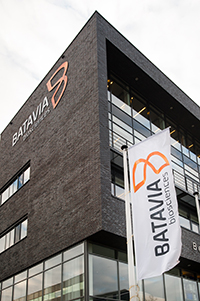
Capitalising on research to benefit patients
Menzo Havenga, CEO of Batavia Biosciences on the Leiden Bio Science Park (LBSP), has a favourite hobbyhorse: the Clinical Development Board. The aim of this board is to make sure that high-impact research results in high-value products that will benefit patients.
Havenga: 'You can think of a Clinical Development Board as a club made up of staff from different companies with different expertises, who are friends of the University and who provide non-binding advice. They advise on such matters as the products that are being developed and whether potential parties are interested in bringing these products to the market - after the necessary testing on humans, of course. Can an item be produced at a reasonable cost, is the researcher using the right raw materials to make sure that it can be used in a clinical environment, and what does the clinical testing process look like? The board helps the researcher and the university to write a grant application - a very laborious task - to make sure the application has a good chance of being honoured, and that the fundamental research has a real chance of reaching the patient. Of course, there are two sides to the story: the companies who are on the board also want to be part of the grant application so they can help the project to fruition.'
More products from high-level research
Batavia Biosciences operates in synergy with the university: researchers do the fundamental research and Batavia helps them convert this into products. Havenga: 'We will achieve a lot more if we write better subsidy applications and help one another to improve them. It's painful to see that many of the subsidies that are awarded don't ultimately lead to a potential solution for patients.' According to Havenga, it's common that a researcher who has been awarded a grant and who has done excellent pre-clinical research is not able to acquire adequate resources for product development. 'That means that, although some excellent research is done, it gives us too few products. Let us work together to make sure that all these fantastic Dutch discoveries are translated into new life sciences products for patients, and that our industry can grow.'
From paper to product
What it takes to get from paper to product is, in Havenga's opinion, seriously underestimated; the process costs between two and six million euros, and a substantial part of that has to be spent on the release of raw materials, semi-finished products and the final product for testing. Havenga: 'Oddly enough, the organisations providing the subsidies all too often underestimate the costs. Like when a minister announces that three million euros are being made available for research, on orphan drugs, for example, and the funding is then divided over eight different projects. It's obvious from the outset that nothing is going to come out of it because there will be no money left for clinical testing. It's a real waste. The Netherlands has this policy - certainly more than other countries - that everything has to be shared out.'
Strengthening the chain
It isn't just the collaboration between the universities and businesses on the LBSP that's important, Havenga says. The business sector also has to collaborate better with the government. Everyone needs to work on strengthening the whole chain. ‘I really want this to work so that as much research as possible does bring benefits to patients.'

Batavia Biosciences is a biotechnology company that develops new technologies to bring medicines to market faster and more cheaply. The company also develops biopharmaceutical production processes for the pharmaceutical industry, for academic and government institutions and for charitable organisations. With a solid laboratory infrastructure in both the Netherlands (Leiden) and the US (Boston), the company supports customers worldwide in developing and producing recombinant proteins, monoclonal antibodies, vaccines and viral vectors.
